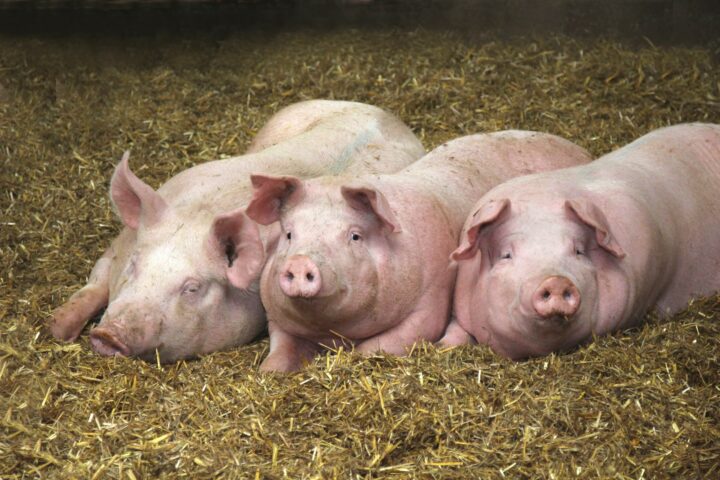
Nobel prize laureate Nüsslein-Volhard: “Genetic engineering offers major opportunities for environmental protection”
Genetically modified plants are not cultivated in Europe, an approach criticized by Christiane Nüsslein-Volhard as anti-scientific and ideology-driven.
Monday, October 31, 2022
This article was first published in the “Tagesspiegel” on 27 October 2022, under the title "Nobel laureate Nüsslein-Volhard: Genetic engineering offers major opportunities for environmental protection"
Christiane Nüsslein-Volhard won the Nobel Prize for Medicine in 1995 for her discoveries relating to how genes drive development in humans and animals. In this interview, she explains why she considers green genetic engineering to be harmless and gives us an insight into her passion for gardening along the way.
Your research involves animals, but for many years you have spoken out in favor of using genetic engineering in agriculture. Why are you interested in this topic?
I am a geneticist, and I also know my plants very well. As a child, I often spent vacations in the countryside and I now have a big garden. Genetic engineering offers major opportunities for environmental protection, including one issue that is particularly close to my heart: we could do something about the demise of insects, which causes me great concern. We could create pest-resistant crops, meaning that fewer pesticides would be needed, or we could create varieties that would thrive even in a drought, or which need less fertilizer. The possibilities are endless.
You first wrote an open letter on this subject 24 years ago. What has changed since then?
The ideologically driven misgivings have become even worse. At the same time, we have taken a huge step forward thanks to genome editing. This was also a revolution for my research group, for our research into fish. The technology has not only become faster, safer and more accurate, we can now do completely new things.
Such as?
We have learned so much about the extremely complex immune system in plants, which makes them resistant to insect damage, or pathogens such as viruses, bacteria and fungi. With genome editing, we can make subtle changes to the genome in several places at once. Many desirable characteristics don’t depend on an individual gene, but on the interaction between several genes. We can also make older good but susceptible varieties more resistant, and much more.
Can you explain why people are so averse to genetically modified plants?
Only with difficulty. There is the general fear of anything new, which can be traced back to the atomic bomb – to that moment when researchers lost their innocence. Since then, people have mistrusted science. But how are plants supposed to be dangerous? Many discussions never clarify that precisely. There were headlines saying that genetically modified corn had caused tumors in rats, but the study was garbage and was also later retracted.
There is some concern that genetically modified plants could proliferate irreversibly in the environment.
Genetically modified crops have been grown in huge fields in many countries for the past 25 years, and to date there is no evidence of any damage to humans, nature or the environment. It was once claimed that genetically modified corn had cross-bred with a wild species, but this was a lie.
But that does not prove that it could not happen in the future.
Is it not proof, when nothing has been found in countless studies? Cultivated crops cannot, in principle, spread like wild plants. They are not able to compete, they have lost their spikes, hairs or shells. The poisonous and bitter substances that protect wild plants from predators have also been bred out. In nature, crops are at a complete disadvantage compared to their wild ancestors.
They could cross-breed with related wild species.
The progeny of such breeding would have no chance. And even if this did happen, there are so many new immigrant plants here, it would hardly be a tragedy.
You hope that green genetic engineering could create plants that can survive with fewer pesticides. But the most successful genetically modified plants are those resistant to glyphosate. This weedkiller is used in huge quantities.
Glyphosate is an excellent weedkiller, even if you’re not supposed to say so any more. The fear people feel about it is completely unfounded. Farmers need to get rid of weeds before they plant seeds. Plowing and harrowing kills plants and mixes up the soil. I myself use glyphosate in my garden and dab it onto individual weed roots – if, for example, the sedge has spread so much that everything else would die otherwise. Digging the weeds up would also kill many other, more welcome plants.
So what is the situation in your garden?
I grow a lot of wild herbs, generally no cultivated species. But I do have to use insecticides sometimes; you are simply powerless against some aphid and beetle infestations. I mostly have slug-resistant shrubs, but I do occasionally use slug pellets.
You don’t worry that glyphosate might be harming you?
Glyphosate inhibits an enzyme that only occurs in plants. Plants need it to create a certain amino acid. Glyphosate is not poisonous for us in the actual sense of the word. It only shrivels plants whose leaves come into contact with it. It does not damage insects or vertebrates and it is biodegradable. After 24 hours, it’s gone.
Glyphosate and other herbicides are also responsible for insect die-off – because insects in single-crop plantations lack food if all weeds are so vigorously destroyed for agricultural purposes.
That has nothing to do with genetic engineering. People love to attribute everything that they do not like about modern farming to genetic engineering. Even here in Germany, where genetic engineering is not used in agriculture. But for economically viable cultivation, we need single-crop plantations and plant protection products, or we will not be able to feed everyone.
Many amateur gardeners make do without glyphosate and slug pellets, and organic farming also manages. Can we not learn from this?
Yes, of course there are several very useful procedures. But they all require a lot of effort and are not certain to succeed.
Do you buy organic food?
Not very often. It is not healthier, but it’s much more expensive. People who buy organic food have the impression that they are doing something good for themselves and for the countryside. But that isn't actually true, because organic farming has a smaller yield and thus needs more land by comparison. It would actually be better to farm a smaller piece of land more efficiently and return other, less lucrative areas to nature.
In the new genetic engineering procedures, the new varieties are in principle no different from those that could arise through random mutations. So should we also make it easier for these varieties to be authorized, as some are calling for?
Genome-edited plant varieties should be excluded from the scope of genetic engineering law. This would also enable field tests, which are vital for trialling a new species. Otherwise they are immediately destroyed by radical opponents. In the long term, the European Genetic Engineering Law of 2001 should be thoroughly reworked to take account of all the positive experiences in “traditional” genetic engineering we have had since then.
Sources
Related articles

What’s Really in Your Shopping Basket
Genetic engineering in our shopping basket? Yes – and much more often than we think. Whether it’s pasta, bread or vegetables: many of the everyday products we consume come from mutation breeding, which involves altering the genome and is considered safe. It’s high time to debunk the common myths.

Genomic breeding methods are not given a chance to prove themselves
Modern genomic breeding methods are legally classified as genetic engineering – and are therefore still effectively blocked. Yet we have been eating genetically modified plants for decades, just under the label of “classical mutagenesis.” The new, more precise techniques are regulated more strictly than the old ones, even though they are considered safer from a scientific perspective. A contradiction that urgently needs to be corrected. The EU is setting a good example.

No Pig Business: Why Testicle-Free Boars Are a Clear Win for Animal Welfare
New breeding methods are opening up new possibilities in both plant and animal breeding. They allow targeted genetic changes that can make animals more resilient, adaptable, and healthier.

Stagnation instead of progress: Switzerland risks falling behind in new breeding techniques
An overview article in Schweizer Bauer shows how much the new breeding methods are preoccupying farming circles. Once the consultation process on the federal law has been completed, a bill is expected – then it will become clear whether there is actually the political will to approve it.

